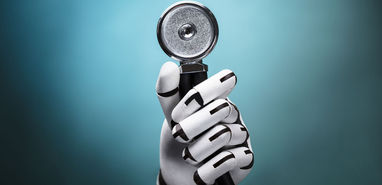
No one who grew up watching Star Trek would find the idea of a computer doctor insane. In fact, for most Trekkies, the idea of having a voice-activated holographic doctor on call all the time seems pretty cool.
Is the AI-powered symptom checker for real?
AI diagnoses are sometimes better for patients than for doctors. Actually, AI-based devices in the medical field have overtaken doctors in cancer and disease diagnosis for many years. However, the use of smart algorithms in the screening process appears to be more beneficial.
Dr. A.I. is designed to work with Amazon Alexa to provide a comprehensive overview of your health, personalized medical details, and symptoms. In addition, it will also recommend you a suitable human doctor according to the situation.
Surely, this is not a substitute for a trained medical professional, but it can help speed up the diagnostic process.
Also, it may analyze data from sources that your doctor is unaware of. Dr. A.I.’s learning effectiveness is making technology more useful day by day, but it is still far from perfect. That’s why an analysis a patient receives today may be based on an incorrect analysis from a few years ago.
Smart chatbots are also prominent in helping people. Dr. A.I. Like, AI-based chatbots can take diagnostic measures and monitor patient medication adherence.
How does it work?
For your everyday health queries, Amazon’s algorithm pulls data from the NHS website. For example, questions such as “What are the symptoms of tonsillitis?”
The government hopes that people will be able to take better control of their health with progression in technology. It is believed to benefit visually impaired and elderly people who can access the Internet with minimal effort.
According to Health Secretary Matt Hancock, it would be better for the NHS to prioritize the technology as it would reduce the pressure on hard-working pharmacists and GPs.
Initially, Alexa was processing health data from various sources, but now it will be bound to NHS’s better and more accurate information.
However, this statement has also been criticized. Many organizations have used public money to provide easy access to front-line services where people can speak to a medical professional and get a prescription, rather than spending it that way.
Another anxiety is that Amazon will save data from questions people ask Alexa. There will be two possibilities either Amazon will use this data and create products that people need, or the data will not remain confidential. Amazon has stated that it will keep all data secure and will not take any such steps. Users can control their voice recording history as they want.
The truth is that technology will play a more active role in our daily lives than ever before.
The future is now people
We’re not quite there yet, but we’re not far off. The Dr. A.I. app developed by Health App allows you to recount your symptoms to your smart speaker. The “Dr” then asks questions to narrow down symptoms.
It’s not a substitute for a live doctor, but it could be helpful in the diagnostic process. The app draws on data from several databases that your real doctor might not have heard of.
This advantage is that you’ll get a breakdown of all potential conditions that might apply. That’s also the downside. If you’ve already got slightly hypochondriac tendencies, you could convince yourself that you have some rare disease.
Still, thanks to the deep learning capabilities of the app, it’s becoming better at nailing down what the symptoms mean. This is much better than asking Dr. Google because the system is designed to group symptoms according to illnesses. So you’ll get some false positives, but not nearly as many as you would if you googled it.
Naturally, you’ll still have to head off to your doc to get the diagnosis confirmed. The upside is that the app might even give you alternative options. For example, if you’ve just got a minor sniffle, it might tell you to rest and take in plenty of liquids.
Are we moving into a Star Trek age?
Well, we have been for quite some time now. Way back, the idea of having a handheld communicator/ scanner seemed quite sci-fi. Today, it looks pretty normal with cell phones that can take pics, scan the internet, and read body temp and vital signs.
Also, considering that 2019 will see a total of 4 billion devices with virtual assistants built-in, we’re already way into sci-fi tech that our grandparents could only dream of.
It’s more than just diagnostics

Siri and her cronies have a few more tricks up their sleeves. Several apps can be programmed to remind you to take meds, input a blood sugar reading, and so on. That’s only the beginning.
Let’s say you’ve taken your blood sugar reading, which is way too high. Perhaps the app can give you tips on reducing it later. Or, if necessary, tell you to get medical attention immediately. Maybe even call an ambulance for you.
The future
Amazon is working on an app that allows Alexa to pick up when a family member is coughing. The idea is that Alexa will eventually be able to distinguish between the different coughs. So she might very well tell you that you have a chesty cough and advice medication to take or a visit to the doctor.
We’ll have a type of holographic doctor
It’s not as you think, though. Instead, our holographic doctors will be real doctors that we consult over messaging systems like Skype. Before you roll your eyes about how insane that sounds, just think about some of the latest wearable techs coming out.
You can wear devices to monitor your temperature, blood pressure, heart rate, and menstrual cycle. Companies have long been working on ways for people to buy over the counter tests for several issues.
The medical visit of the future could well be very different. You might never have to get bored enough to read an ancient magazine in your doctor’s waiting room again.
Imagine this scenario. You’re feeling ill, so you strap on your smartwatch. It measures your vitals and relays this information to your medical file. You decide to make an appointment with your doctor.
He’s got the information he needs in terms of vitals. He can do a fair assessment of your condition via Skype. He’ll have a look at that rash you’ve developed. From there, he can suggest a treatment regimen or more tests.
He’ll order the tests to be sent to your home. You perform the tests and get the results back. He prescribes meds or asks to see you in person. If you don’t need to go in, your meds are dispatched to you at home.
Clearly, we’ve still got a way to go before this kind of scenario proves tenable. But it could be a great way for an overburdened health system to provide quality care for less serious afflictions.
It does seem like we’re heading to a future where the old question, “Is there a doctor in the house?” is becoming obsolete. So pay attention to those sci-fi movies from now on. They could be pointing the way for our own future.








By Andrej Kovacevic
Updated on 2nd August 2022